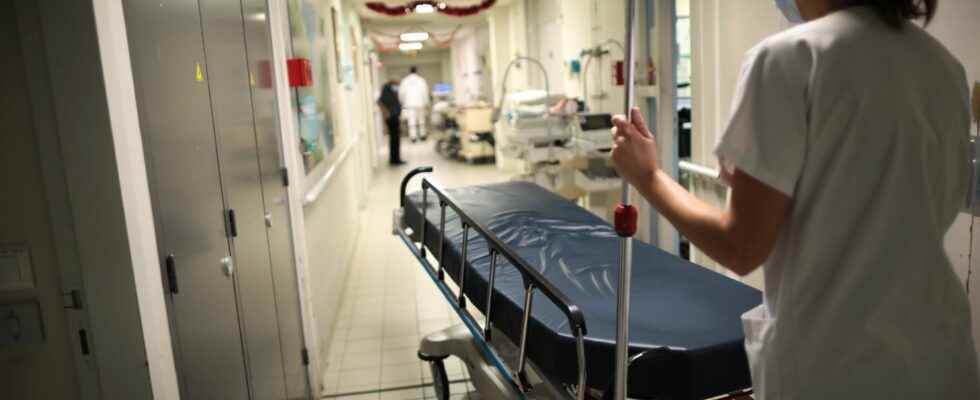Will Emmanuel Macron become aware of the extent of the crisis that the health system is going through in France? Two days before the wishes of the Head of State to health professionals, it is more necessary than ever to remember: the public hospital is cracking, and is dangerously in danger of collapsing. A figure taken up on January 2 by Philippe Juvin, LR deputy for Hauts-de-Seine and professor of medicine, on CNews is chilling: during the month of December 2022, “there were officially 23 or 24 people who died on stretchers in France, and, given the under-declaration, this figure would be around 100 to 150 people who died on a stretcher in the hospital, in France, over a month, for lack of care”. Are these claims verified?
Unfortunately, the answer is yes. These figures were initially revealed by Samu-Urgence France, an emergency medicine union formerly chaired by the current Minister of Health, François Braun. However, they need to be contextualized. First of all, the data set out by Philippe Juvin two days ago – and which may seem surprising – are in reality already outdated. On its website, Samu-Urgence France updates a daily counter listing “unexpected deaths”, and this figure was 32 on Wednesday January 4. Then, it only shows part of the reality because this dashboard is only based on the voluntary declarations of the departments to the union. To sum up, to date, the number of “unexpected deaths” is 32 in 19 departments. And the organization to specify: “extrapolation of whole France over the period> 150”. This figure of “more than 150 unexpected deaths” in one month in the corridors of emergencies is therefore not verified data but an estimate made for the whole territory from data collected from 32 departments. Still, the dynamic is surprising and worrying.
So much for the numbers. Let us now specify what this concept of “unexpected deaths” represents. “These are people who were not expected to die in the emergency room (a person in the emergency room waiting for a hospital bed, for example), specifies to L’Express Agnès Ricard -Hibon, emergency physician and spokesperson for the Emergency Medicine Society. This should be differentiated from ‘preventable deaths’ where tests are required to prove the death was preventable.” Although these figures seem very high, it is not possible to compare them with previous years because the union’s approach is new. “There is a huge gap between the critical situation experienced in hospitals and the perception of the situation in the general population. It is terrifying, to be forced today to count the unexpected deaths to alert and convince the population and the public authorities on the seriousness of the crisis in the hospital. On the one hand, we want people to get vaccinated, wear masks, etc. to protect themselves and not overcrowd hospitals; and on the other hand, we alert elected officials on the urgency of implementing the solutions already proposed by professionals in the field”, deplores Agnès Ricard-Hibon.
“We must act now”
The current triple epidemic (Covid-19, influenza and bronchiolitis) combined with the lack of personnel has led many intensive care units, for example, to be saturated. On December 27, 2022, we learned that, throughout the Île-de-France region, there was only one intensive care bed left, at Cochin hospital. In Hauts-de-France, the situation is currently the same. At the Strasbourg University Hospital, there were no fewer than 220 visits per day to the two emergency reception sites in December. A figure up 6% compared to 2021, which was already a record year. At the CHR of Metz-Thionville (Moselle), we are also recruiting six nurses and six nursing assistants for emergencies, whose staff have massively declared themselves on sick leave. Caregivers express their “physical and psychological exhaustion” in the face of the difficulties of taking care of patients in a service which regularly records more than 100 visits per day but has only 12 reception boxes, and in an establishment which lacks hospital beds. Several caregivers, for example, reported a 90-year-old patient who remained “more than 90 hours” on a stretcher, and who was “changed only once” during this period. In short, the examples are legion throughout France, and the crisis is deep.
“There are emergencies where there are no more boxes available to accommodate new patients. They are full of people waiting for hospital beds, but emergencies are not hospitalization services!” Ton Agnes Ricard-Hibon. In 2019, a report was sent to the Ministry of Health to take stock of the excess mortality linked to overcrowding in the emergency services, and the results were already not famous: 9% death for “current” patients “, + 30% for the most serious. “What have we done since? We find ourselves in a much worse situation than in 2020 during the big waves of Covid”.
Pointed out for several years, the structural lack of caregivers in France had reached a critical level during the Covid-19 epidemic. The government has since responded with a 19 billion euro plan to strengthen the health system and the attractiveness of the profession. A plan that, however, is slow to produce its effects. “We must act now because afterwards it will be too late”, assures Agnès Ricard-Hibon.
